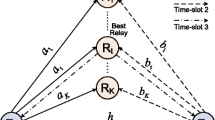Abstract
In this paper, we propose a cooperative transmission scheme using quasi-orthogonal space-time block codes (QOSTBCs) for multiple-input multiple-output (MIMO) relay networks. Comparing with the conventional cooperative transmission scheme using orthogonal space-time block codes (OSTBCs), the proposed scheme can achieve higher bandwidth efficiency with the same decoding complexity. Moreover, an adaptive decode-and-forward (ADF) relaying protocol is proposed based on one-bit channel state information (CSI) feedback. According to the CSI feedback, a better transmission mode can be selected between the direct transmission and decode-and-forward (DF) cooperative transmission. In addition, the outage performance of the proposed scheme is investigated and a closed-form upper bound on the outage probability is derived. The performance analysis shows that the proposed scheme can achieve a full diversity order, which is higher than that of the direct and DF cooperative transmissions.
Similar content being viewed by others
References
Yang Y., Hu H., Xu J., Mao G. (2009) Relay technologies for WiMax and LTE-advanced mobile systems. IEEE Communications Magazine 47(10): 100–105
Sendonaris A., Erkip E., Aazhang B. (2003) User cooperation diversity-Part I and Part II. IEEE Transactions on Communications 51(11): 1927–1948
Nosratinia A., Hunter T., Hedayat A. (2004) Cooperative communication in wireless networks. IEEE Communications Magazine 42(10): 74–80
Laneman J. N., Tse D. N. C., Wornell G. W. (2004) Cooperative diversity in wireless networks: Efficient protocols and outage behavior. IEEE Transactions on Information Theory 50(12): 3062–3080
Laneman J. N., Wornell G. W. (2003) Distributed space-time-coded protocols for exploiting cooperative diversity in wireless networks. IEEE Transactions on Information Theory 49(10): 2415–2425
Nabar R. U., Bölcskei H., Kneubuhler F. W. (2004) Fading relay channels: Performance limits and space-time signal design. IEEE Journal on Selected Areas in Communications 22(6): 1099–1109
Jing Y., Hassibi B. (2006) Distributed space-time coding in wireless relay networks. IEEE Transactions on Wireless Communication 5(12): 3524–3536
Jing Y., Jafarkhani H. (2007) Using orthogonal and quasi-orthogonal designs in wireless relay networks. IEEE Transactions on Information Theory 53(11): 4106–4118
Maham B., Hjørungnes A., Abreu G. (2009) Distributed GABBA space-time codes in amplify-and-forward relay networks. IEEE Transaction on Wireless Communications 8(4): 2036–2045
Zhang, C., Wang, W., & Wei, G. (2010). Distributed space-time codes using constellation rotation. Wireless Personal Communications, Published online: 4 May, 2010.
Telatar E. (1999) Capacity of multiantenna gaussian channels. European Transactions on Telecommunications 10(6): 585–596
Abdaoui A., Ikki S. S., Ahmed M. H., Châtelet E. (2010) On the performance analysis of a MIMO-relaying scheme with space-time block codes. IEEE Transactions on Vehicular Technology 59(7): 3604–3609
Yang L., Zhang Q. T. (2010) Performance analysis of MIMO relay wireless networks with orthogonal STBC. IEEE Transactions on Vehicular Technology 59(7): 3668–3674
Dharmawansa P., McKay M. R., Mallik R. K. (2010) Analytical performance of amplify-and-forward MIMO relaying with orthogonal space-time block codes. IEEE Transactions on Communications 58(7): 2147–2158
Chalise B. K., Vandendorpe L. (2008) Outage probability analysis of a MIMO relay channel with orthogonal space-time block codes. IEEE Communication Letters 12(4): 280–282
Yang, Q., Kwak, K. S., & Fu, F. (2009). Outage performance of cooperative relay using STBC systems. Wireless Personal Communications, Published online: 5 February, 2009.
Jafarkhani H. (2005) Space-time coding: theory and practice. Cambridge University Press, Cambridge
Tarokh V., Jafarhani H., Calderbank A. R. (1999) Space-time block codes from orthogonal designs. IEEE Transactions on Information Theory 45(5): 1456–1467
Su W., Xia X. (2004) Signal constellations for quasi-orthogonal space-time block codes with full diversity. IEEE Transaction on Information Theory 50(10): 2331–2347
Lee, H., Cho, J., Kim, J., & Lee, I. (2006). An efficient decoding algorithm for STBC with multi-dimensional rotated constellations. Proceedings of ICC (pp. 5558–5563). Istanbul: IEEE.
Yuen C., Guan Y., Tjhung T. (2005) Quasi-orthogonal STBC with minimum decoding complexity. IEEE Transaction on Wireless Communications 4(5): 2089–2094
Azzam, L., & Ayanoglu, E. (2008). Maximum likelihood detection of quasi-orthogonal space-time block codes analysis and simplification. Proceedings of ICC (pp. 3948–3954). Beijing: IEEE.
Alamouti S. M. (1998) A simple transmit diversity technique for wireless communications. IEEE Journal on Selected Areas in Communnication 16(10): 1451–1458
Yuen, C., Guan, Y., & Tjhung, T. (2005). Quasi-orthogonal STBC with minimum decoding complexity: Further results. Proceedings of WCNC (pp. 483–488). Los Angeles: IEEE.
Goldsmith A. (2005) Wireless communications. Cambridge University Press, Cambridge
Lei X., Fan P. (2008) Comment on outage probability analysis of a MIMO relay channel with orthogonal space-time block codes. IEEE Communication Letters 12(10): 720–721
Yuksel M., Erkip E. (2007) Multiple-antenna cooperative wireless systems: A diversity-multiplexing tradeoff perspective. IEEE Transaction on Information Theory 53(10): 3371–3393
Author information
Authors and Affiliations
Corresponding author
Additional information
This work was supported by the National Major Specialized Project of Science and Technology (No. 2009ZX03003-003, 2009ZX03003-004), the Program for Changjiang Scholars and Innovative Research Team in University (No. IRT0852), and the National Natural Science Foundation (No. 61001207).
Rights and permissions
About this article
Cite this article
Gao, Y., Ge, J. & Ji, Y. Cooperative Transmission Using Quasi-Orthogonal Space-Time Block Codes with Adaptive Decode-and-Forward Relaying Protocol. Wireless Pers Commun 63, 731–749 (2012). https://doi.org/10.1007/s11277-010-0163-9
Published:
Issue Date:
DOI: https://doi.org/10.1007/s11277-010-0163-9




